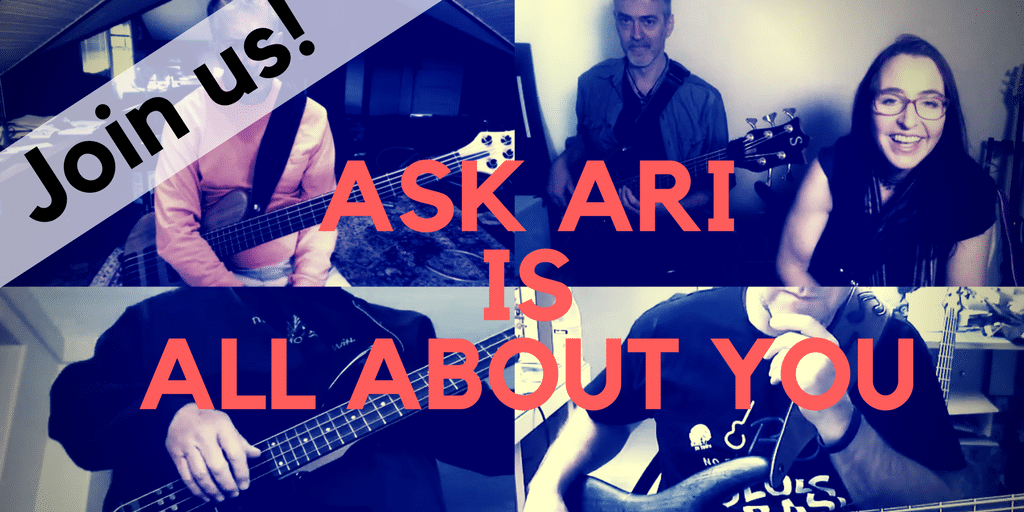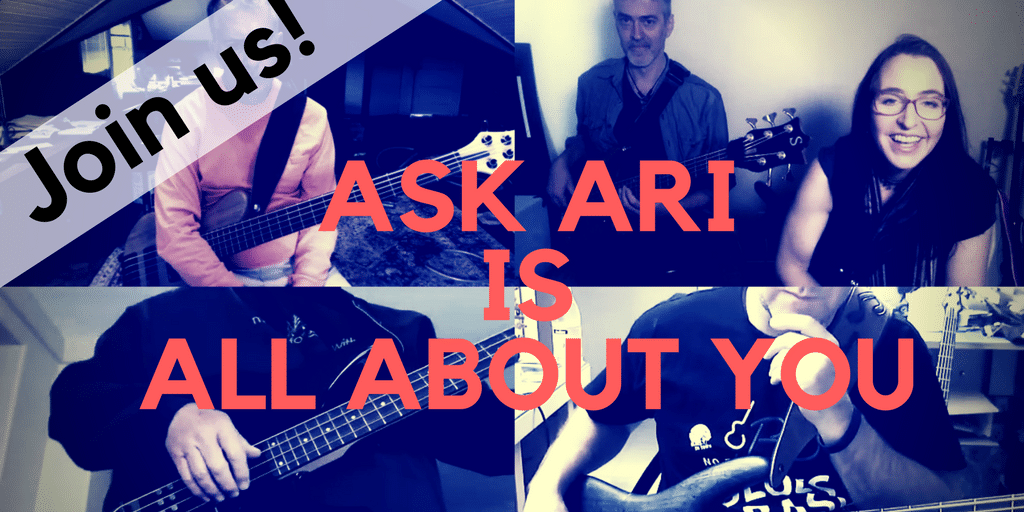I received an email this morning from a course participant (let’s call him CP). He received the Monthly Ask Ari reminder and felt pressured as if failing at school, not good enough, not with the program…
Ari, I am so behind on the course. Can I even participate in Ask Ari Live??
For those of you who don’t know, Ask Ari Live featuring Wolf (when we can get him) is a 60 minute live Q&A for participants of our 20 Unit Music Theory for the Bass Player Coaching Course. Wolf is my own bass teacher from way back when, composer, bassist and co-creator of the course. We convene every first Sunday of the month at noon Pacific and are there for your questions.
The course is designed to help you gain consistency by opening up a new unit each week. You get weekly reminder emails telling you – hey a new unit opened up, but you can ignore those emails and access any unit that is opened for you via the course menu. If this weekly assignment business reminds you of school and if it gives you the heebie-jeebies because of that, let me do a bit of reframing for you. We designed the Course to take the good things that worked in school, but let’s leave behind the baggage… whether you are in the course or not, let’s see how we can optimize our practice and learning routines.
School…
Way back in school, we learned a bunch of things quite effectively. But there likely were also things that made learning very hard. We were so used to learning under pressure that it may sometimes be very hard to turn off that pressure switch, to believe we can even learn effectively without a teacher wagging a finger at us or a big test looming on the horizon. But we can. And we can take the aspects of school that work and leave behind the ones that don’t!
Showing up = Process. It works.
Back in school, we had homework and tests and maybe weekly lessons with a music teacher. But every morning 7.30 AM, we squeezed behind that desk.
Regularity works for learning. YES! Consistency is where it’s at. 45 minutes 5 times a week (my standard recommendation) will get you big improvements if done right.
Do a bit every day, follow along with the Finger Kung Fu videos (technique exercises), read the assigned book pages and go through the Theory practice videos, do some Bass Line Lab to apply that theory, circle back around for more later, keep moving. If you drop the ball because life happens, that’s okay. Just pick back up again, course participants have lifetime access. Videos and text throughout the course remind you of this and exactly how to do this: be consistent and keep moving.
Grades! Pressure! (Works in a limited way)
But in school there were tests. And dog-ate-my-homework events, and pressure and disappointing looks from parents. More often than not the joy of learning got drilled out of us that way because test outcomes were sometimes tied to approval from others.
“There will be a test on Monday” may work for the short term. Sure, it will get our rear in gear. But we now know that relaxation and effortlessness aide learning in a powerful way.
For example:
- Ever tried to learn some text by heart? Were you sweating it?
- How about the lyrics of your favorite song? (Man, I can still sing along to my favorite 80’s tunes, even if I haven’t heard them in decades!)
Interesting how that works, isn’t it? Without trying and because we love it, we can recall lyrics. The Gettysburg Address? Maybe not so much.
What works: Relaxing while learning. Enjoying it.
Goals are great but focus on consistency rather than immediate outcomes. And: positive self-talk! Enjoy the learning
Tests, checkpoints, milestones, and goals are motivators, no doubt about it. It is just that when it is paired with thinking we are not good enough, that we might not pass, “don’t have enough talent” or similar that we set ourselves up for frustration and failure. Support yourself with positive talk, let go of the goals (musical progress can be hard to “grade”) and focus on consistency and the doing. Check if what you are doing is working every three months or so. If it isn’t working, change it!
What also worked in school:
Connection
It is easier to do it together with your buddies. Nothing beats personal interaction, looking over your buddy’s shoulder, watching a teacher, asking a specific question. Remember show and tell? That! That’s why we added Ask Ari Live to the course!
Live interaction works. It is motivating, a great regular touch point, a way to connect with others. The way we do it you can ask questions via chat or even join us live on stage. Here, for example, are three participants from the UK, Israel and California chatting with me and Wolf about bass while about 80 others are watching:
Learning is circular, not linear
This worked in school because school forced us to move on even if we didn’t get it perfectly the first time. Maybe 2+2 was easy, but 2-3 was hard. So you didn’t get it the first time, but it kept coming round. And in different ways: 4-3, then 3-4, then 4+2-7…
This is why in the course we go over key concepts over and over again. In different keys, different areas of the bass.
A few more examples:
- The first time you said note names up a string you thought you were going out of your mind. A few weeks in, on a different string now, it is sure coming along.
- The first note-finder was super hard, The tenth isn’t, even if we are using a different note each time. Move on to F#, even if you didn’t master G quite yet.
- The first time you went through the cycle just playing roots you needed the cheat sheet. Now that we are doing it with major seventh chords, it is a breeze.
By using the material in different contexts over and over, we get a better and better grip on it till it shows up on the bandstand.
Take the good that worked from school: Consistency. Community. Circling back around.
So, CP, do join us for Ask Ari Live, no matter where you are in the course. All questions are welcome, any unit, or anything not from the course, ask away. There is no grade you have to make! Everyone goes at their own pace, just keep moving. Report how it’s going, lurk a bit or drop a line in the chat or come on stage. It’s up to you, but you are welcome!
Leave behind the pressures, relax while you learn, use goals as motivators and enjoy the process. By showing up with your bass you have already made the one honor roll that really counts: YOURS!
Ask Ari Live meets Every First Sunday of the Month for Course Participants.
More info on our course:






